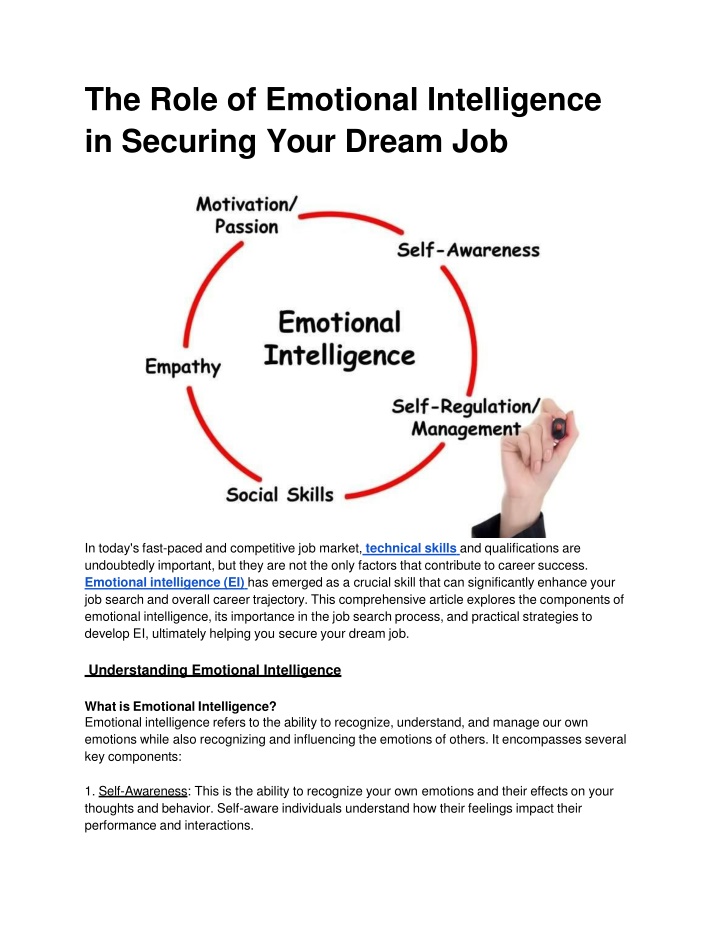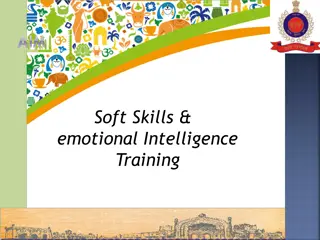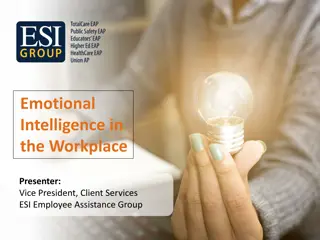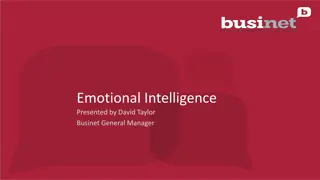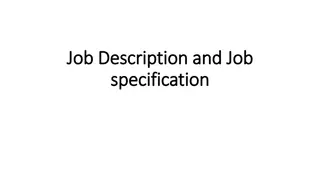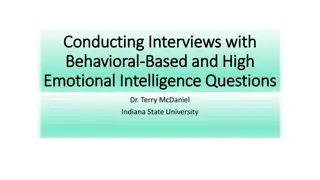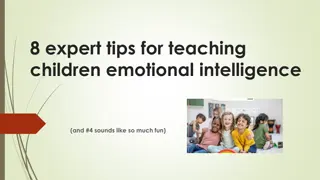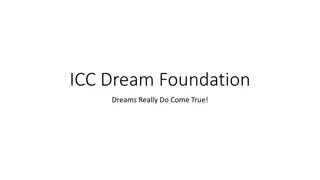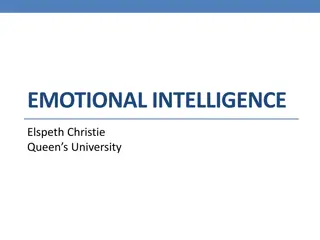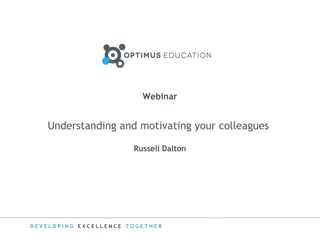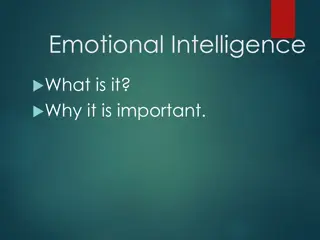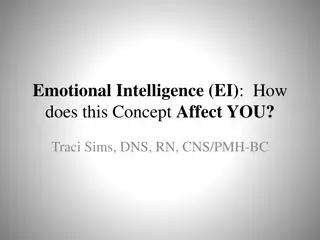The Role of Emotional Intelligence in Seuring Your Dream Job -article
The Role of Emotional Intelligence in Seuring Your Dream Job
Download Presentation

Please find below an Image/Link to download the presentation.
The content on the website is provided AS IS for your information and personal use only. It may not be sold, licensed, or shared on other websites without obtaining consent from the author.If you encounter any issues during the download, it is possible that the publisher has removed the file from their server.
You are allowed to download the files provided on this website for personal or commercial use, subject to the condition that they are used lawfully. All files are the property of their respective owners.
The content on the website is provided AS IS for your information and personal use only. It may not be sold, licensed, or shared on other websites without obtaining consent from the author.
E N D
Presentation Transcript
The Role of Emotional Intelligence in Securing Your Dream Job In today's fast-paced and competitive job market, technical skills and qualifications are undoubtedly important, but they are not the only factors that contribute to career success. Emotional intelligence (EI) has emerged as a crucial skill that can significantly enhance your job search and overall career trajectory. This comprehensive article explores the components of emotional intelligence, its importance in the job search process, and practical strategies to develop EI, ultimately helping you secure your dream job. Understanding Emotional Intelligence What is Emotional Intelligence? Emotional intelligence refers to the ability to recognize, understand, and manage our own emotions while also recognizing and influencing the emotions of others. It encompasses several key components: 1. Self-Awareness: This is the ability to recognize your own emotions and their effects on your thoughts and behavior. Self-aware individuals understand how their feelings impact their performance and interactions.
2.Self-Regulation: This involves managing your emotions in healthy ways, controlling impulsive feelings, and adapting to changing circumstances. Self-regulation helps you stay calm under pressure and make thoughtful decisions. 3.Motivation: This component refers to being driven to achieve for the sake of achievement. Individuals with high emotional intelligence maintain a positive outlook even in challenging situations and are often more resilient. 4. Empathy: Empathy is the ability to understand the emotions of others and respond appropriately. It involves being attuned to the feelings of others, which can enhance communication and collaboration. 5.Social Skills: This encompasses managing relationships effectively, communicating clearly, and resolving conflicts. Strong social skills enable you to build networks and work collaboratively with others. These components work together to create a framework for understanding how emotional intelligence can impact your job search and career development. The Importance of Emotional Intelligence in Job Searching In a job market where many candidates possess similar qualifications and experiences, emotional intelligence can be a differentiating factor that sets you apart from the competition. Here are several ways EI can enhance your job search: 1. Enhancing Your Job Search Strategy Emotional intelligence plays a pivotal role in how you approach your job search: Improved Networking: High EI allows you to build genuine connections with others. By understanding and relating to potential contacts' feelings, you can foster relationships that may lead to job opportunities. Networking is often about quality over quantity; meaningful connections can open doors that a simple resume submission cannot. Effective Communication: Strong social skills enable you to articulate your value during interviews and networking events. Being able to communicate effectively can set you apart from other candidates who may have similar qualifications but lack interpersonal skills. Resilience in Setbacks: Job searching can be discouraging, with rejection being a common experience. A strong sense of self-regulation helps you manage disappointment and maintain motivation despite setbacks. Those with high EI are better equipped to bounce back from rejection and continue pursuing their goals. 2. Mastering Interviews with Emotional Intelligence
Interviews are often the most challenging part of the job search process. Emotional intelligence can significantly enhance your performance during interviews. Handling stressful situations: High EI helps you stay calm under pressure. This ability is crucial when faced with difficult questions or unexpected scenarios during interviews. Candidates who can manage their anxiety are more likely to present themselves confidently. Reading Non-Verbal Cues: Understanding body language and emotional cues allows you to adjust your responses based on the interviewer's reactions, creating a more engaging conversation. Being attuned to non-verbal signals can help you gauge how well the interview is going. Demonstrating Empathy: Showing empathy during an interview can help create a connection with the interviewer. This connection can make you more memorable compared to other candidates who may focus solely on their qualifications. 3. Building Long-Term Career Success Emotional intelligence is not only vital for securing a job but also for long-term career success: Team Collaboration: Individuals with high EI tend to be better team players. They communicate effectively, resolve conflicts amicably, and contribute positively to team dynamics. Employers value employees who can collaborate well with others. Leadership Potential: Many employers look for leadership qualities even in entry-level positions. High EI is often associated with strong leadership skills, making you a candidate for future promotions. Leaders with high emotional intelligence inspire trust and loyalty among their teams. Adaptability: The modern workplace is constantly evolving due to technological advancements and changing market conditions. Those with high emotional intelligence are generally more adaptable to change, making them valuable assets during organizational transitions. Developing Your Emotional Intelligence Improving your emotional intelligence is an ongoing process that requires self-reflection and practice. Here are some practical strategies: 1. Self-Awareness Exercises To enhance self-awareness: Keep a Journal: Write down your daily emotions and reflect on what triggered them. This practice helps you identify patterns in your emotional responses.
Mindfulness Meditation: Engage in mindfulness practices that encourage present-moment awareness. Mindfulness meditation can help you become more attuned to your feelings without judgment. Seek Feedback: Ask trusted friends or colleagues for feedback on how they perceive your emotional responses in various situations. This external perspective can provide valuable insights into areas for improvement. 2. Self-Regulation Techniques To improve self-regulation: - Develop Coping Strategies: Identify healthy coping mechanisms for stress, such as deep breathing exercises or physical activity. These strategies will help you manage negative emotions effectively. Set Personal Goals: Establish achievable personal goals that challenge you while allowing room for growth. Working towards these goals fosters resilience as you learn to navigate obstacles along the way. Practice delayed Gratification: Train yourself to pause before reacting impulsively in emotionally charged situations. Taking a moment to breathe or count to ten can help you respond thoughtfully instead of reacting instinctively. 3. EmpathyDevelopment To build empathy: Practice Active Listening: Give full attention when others speak without interrupting or formulating responses in your mind while they talk. Show genuine interest in their feelings and perspectives. Engage in Perspective-Taking Exercises: Try to understand situations from others' viewpoints by asking yourself how they might feel or why they might react a certain way. Volunteer or Help Others: Engaging in community service or helping those in need can broaden your perspective on different life experiences, enhancing your capacity for empathy. 4. SocialSkills Enhancement To boost social skills: - Join Networking Groups or Clubs: Participate in professional organizations or interest-based groups where you can practice interacting with diverse individuals in various settings. Seek Feedback on Communication Style: Ask trusted friends or mentors for constructive feedback on how effectively you communicate ideas or emotions during conversations.
Role Play Scenarios: Practice common social situations or difficult conversations through role-playing exercises with friends or colleagues, allowing you to refine your approach in a safe environment. The Impact of Emotional Intelligence on Job Performance Emotional intelligence not only aids in securing a job but also has profound implications for job performance once employed: 1. Enhanced Workplace Relationships Employees with high emotional intelligence tend to have better relationships with colleagues, supervisors, and clients: Conflict Resolution: High EI individuals are skilled at navigating conflicts by understanding different perspectives and finding common ground, leading to healthier workplace dynamics. Collaboration: They foster teamwork by encouraging open communication and supporting each other's contributions, creating a more cohesive work environment. 2. IncreasedJob Satisfaction Emotional intelligence contributes significantly to overall job satisfaction: Positive Work Environment: Employees who understand their own emotions are better equipped to create positive interactions that contribute to a supportive work culture. Stress Management: High EI individuals tend to cope better with workplace stressors, leading to lower burnout rates and higher overall satisfaction levels. 3. ImprovedDecision-Making Emotional intelligence enhances decision-making capabilities: Balanced Decision-Making: Individuals with high EI consider both emotional factors and logical reasoning when making decisions, leading to more balanced outcomes that take into account human factors alongside data-driven insights. Risk Assessment: They are adept at assessing potential risks associated with decisions based on understanding both personal feelings and team dynamics, resulting in more informed choices. Case Studies Illustrating the Importance of Emotional Intelligence Tofurther illustrate the impact of emotional intelligence on securing jobs and enhancing career success, let s look at some real-world examples:
Case Study 1: The Successful Networker Sarah was an ambitious graduate seeking her first full-time position after college graduation. Despite having strong academic credentials, she struggled initially during her job search due largely to a lack of networking skills; she found it difficult connecting with industry professionals at events because she felt anxious meeting new people face-to-face. Recognizing this challenge as an obstacle toward achieving her goal of landing her dream marketing role within six months post-graduation, Sarah decided it was time for change she enrolled herself in public speaking workshops designed specifically aimed at improving social interactions while building confidence levels through practice scenarios involving networking events! Over time, through dedication & persistence combined alongside feedback from peers & mentors alike throughout this journey Sarah transformed herself into someone who thrived socially! Her newfound confidence allowed her to not only successfully navigate conversations but also forge meaningful connections, eventually leading directly towards securing multiple interviews ultimately landing her desired position within three months time frame! Conclusion Emotional intelligence is a vital skill that significantly impacts both job searching efforts as well as long-term career success! By understanding managing emotions effectively, candidates can improve networking opportunities, excel at interviews, and foster lasting professional relationships! As individuals develop their emotional intelligence through self-awareness, self-regulation, empathy, and social skills, they increase their chances of landing dream jobs while enhancing overall career fulfillment! Incorporating emotional intelligence into job search strategies allows candidates to stand out in a crowded market where technical skills alone may not suffice! By leveraging these interpersonal abilities, individuals prepare themselves not just for a single role but equip themselves for a successful career journey ahead! As we move forward into increasingly complex workplaces shaped by technology globalization, it becomes crucial to recognize the value emotional intelligence plays in shaping future workforce dynamics and ultimately paving way brighter paths ahead! So take time to invest effort in developing these essential soft skills today you never know what doors might open tomorrow!
